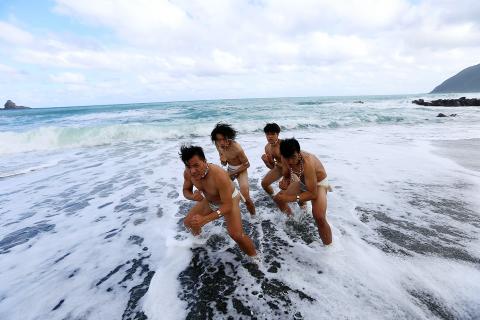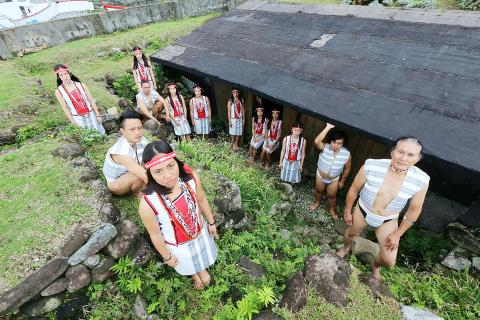The Formosa Indigenous Dance Foundation of Culture and Arts (原住民族樂舞劇) is celebrating its 25th anniversary with a new show, Maataw: the Floating Island (浮島), at the National Theater in Taipei this weekend, commissioned by the Council of Indigenous Peoples.
Well, technically. It is 25 years since the Formosa Aboriginal Song and Dance Troupe (原舞者) was founded — the name was changed to the foundation in 2001 to better reflect the diversity of its work and for management reasons.
The troupe, which was founded by a group of friends in Kaohsiung in 1991, relocated to Taipei’s Xindian District (新店) a year later and slowly began to develop a reputation for its research and reconstruction efforts to preserve the traditional songs and dances of Aboriginal communities, as well as for its performances. From the beginning, the company adopted an almost anthropological approach, with troupe members, sometimes joined by academics, visiting elders to learn a community’s language, songs, ceremonies and other traditions.

Photo courtesy of the Formosa Indigenous Dance Foundation of Culture and Arts
Based in Hualien since 2007, the troupe is made up of performers from several communities, including Amis, Bunun, Paiwan and one from the Tao. However, just because they are Aboriginals themselves, does not mean they have an easy time convincing members of other indigenous communities to share their traditions.
Maataw is the story of the Tao of Orchid Island (Lanyu, 蘭嶼). Not only is the production the first time the troupe has developed a show based on the Tao culture, it is the first time the story of the Tao is being presented in the National Theater.
For many in Taiwan, the Tao and Lanyu conjure up images of flying fish, men in loinclothes, bark breastplates and metal helmets — and Taiwan Power Co’s (Taipower) controversial dry cask nuclear waste storage facility.

Photo courtesy of the Formosa Indigenous Dance Foundation of Culture and Arts
Maataw director Fangas Nayaw said he made his first trip to Lanyu in January last year to do research, while other troupe members made the first of what would eventually be three trips in May.
The Tao culture is different from that of other indigenous communities in Taiwan, and there were a lot of sensitivities to surmount, both in terms of detailing their traditions — the songs “belong” to families in the community — and because of modern-day political issues, such as the long-running controversies surrounding the nuclear waste storage facility and the government’s promotion of Aboriginal culture and ceremonies as tourist attractions, which has made many Tao suspicious of dealing with outsiders. Tao elders were initially reluctant to teach their songs and dances to troupe members.
“Maataw” in the Tao language means “islands floating in the sea,” and is used to describe an image of the solidity of islands in the midst of ever-moving ocean waves.

Photo courtesy of the Formosa Indigenous Dance Foundation of Culture and Arts
Nayaw said the show has four acts and its storyline is based on traditional Tao ceremonies, but it also incorporated some of the issues facing the Tao today.
Act I begins with the way the Tao start the year — with the “calling of the fish.” This is followed by the annual fish festival and the harvest festival, which includes the “hair dance” by the women and a rice-pounding dance by the men. Then there is the “Mikariag,” or what Nayaw described as the “Tao’s karaoke,” which begins with hand clapping, then the first singer starts a song, followers join in and then the chorus chimes in. Traditionally, a “Mikariag” would begin about 9pm and continue until dawn, he said. The final act revolves around the naming ceremony, when the community elder gives a newborn his or her name.
The Tao are understandably unhappy that their home has become known for the nuclear waste site, which was built in 1982 without first consulting them and which has created a number of public health and policy problems.
A more recent issue is the government’s promotion of traditional Aboriginal festivals and ceremonies as a tourism draw for domestic and foreign tourists. Many of the tourists who attend such events, perhaps out of ignorance of the cultural significance and community sensitivities, are too intrusive when photographing and filming, or even worse, want to participate in the dances.
While this is an issue of increasing concern among Aboriginal communities around the nation, Nayaw said it is especially pressing for the Tao because Lanyu is so small.
“Outsiders coming to Lanyu are already too disturbing, going too close with their cameras, phones and selfie sticks. The Tao are calm, serious about their ceremonies, the outsiders are not,” he said.
He said he felt he had to walk a fine line in developing the show, respecting Tao culture when introducing it, but also letting people know about the problems that they face.
“My theater work combines the ceremonies of indigenous people into theater; it’s a combination of singing, dancing, acting,” said Nayaw, who has a bachelor’s degree from National Taiwan University and a master’s in fine arts from Taipei National University of the Arts. “But to do a theater production you have to change the point of view.”
“Theater has magical power, a fascination with different elements. Culture has to be told in theater — not in movies, not in photographs — we are dancing for you, telling a story, the stories are on our bodies,” he said.
Maataw is one of the larger theater shows the troupe has developed, with 30 performers, including Faidaw Fagod, the troupe’s artistic director. One of the reasons the Council of Indigenous Peoples came on as the producer is that it had the budget to do a big show.
Maataw runs 110 minutes, with a 15-minute intermission. A Chinese translation of the lyrics and dialogue is provided by screens on either side of the stage, while there is a brief English-language introduction to the show in the program.

William Liu (劉家君) moved to Kaohsiung from Nantou to live with his boyfriend Reg Hong (洪嘉佑). “In Nantou, people do not support gay rights at all and never even talk about it. Living here made me optimistic and made me realize how much I can express myself,” Liu tells the Taipei Times. Hong and his friend Cony Hsieh (謝昀希) are both active in several LGBT groups and organizations in Kaohsiung. They were among the people behind the city’s 16th Pride event in November last year, which gathered over 35,000 people. Along with others, they clearly see Kaohsiung as the nexus of LGBT rights.

Jan. 26 to Feb. 1 Nearly 90 years after it was last recorded, the Basay language was taught in a classroom for the first time in September last year. Over the following three months, students learned its sounds along with the customs and folktales of the Ketagalan people, who once spoke it across northern Taiwan. Although each Ketagalan settlement had its own language, Basay functioned as a common trade language. By the late 19th century, it had largely fallen out of daily use as speakers shifted to Hoklo (commonly known as Taiwanese), surviving only in fragments remembered by the elderly. In

Dissident artist Ai Weiwei’s (艾未未) famous return to the People’s Republic of China (PRC) has been overshadowed by the astonishing news of the latest arrests of senior military figures for “corruption,” but it is an interesting piece of news in its own right, though more for what Ai does not understand than for what he does. Ai simply lacks the reflective understanding that the loneliness and isolation he imagines are “European” are simply the joys of life as an expat. That goes both ways: “I love Taiwan!” say many still wet-behind-the-ears expats here, not realizing what they love is being an

In the American west, “it is said, water flows upwards towards money,” wrote Marc Reisner in one of the most compelling books on public policy ever written, Cadillac Desert. As Americans failed to overcome the West’s water scarcity with hard work and private capital, the Federal government came to the rescue. As Reisner describes: “the American West quietly became the first and most durable example of the modern welfare state.” In Taiwan, the money toward which water flows upwards is the high tech industry, particularly the chip powerhouse Taiwan Semiconductor Manufacturing Co (TSMC, 台積電). Typically articles on TSMC’s water demand